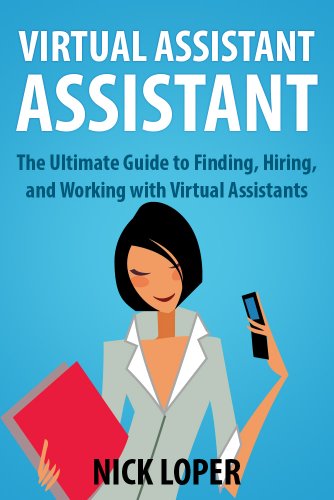10 Most Useful Tips Before Hiring a Virtual Assistant in 2024
The virtual assistant (VA) industry is expanding rapidly, fueled by the growth of remote work, digital transformation, and the increasing demand for flexible work solutions. Entrepreneurs, startups, and even established businesses are turning to virtual assistants to streamline operations, manage tasks, and improve productivity without the overhead costs of hiring full-time employees. However, before diving into the process of hiring a virtual assistant in 2024, it’s essential to take some time to plan carefully.
Hiring the right virtual assistant can have a huge positive impact on your business, while making the wrong choice can lead to inefficiencies and wasted time. In this comprehensive guide, we’ll go through the 10 most useful tips you should know before hiring a virtual assistant in 2024. But before we dive in, here's your $25 off coupon code that you can use to sign-up to any of AskSunday's dedicated assistant plans, and try our services risk-free for the first 7 days / 3 hours : "TRYFREE25". Now let's turn to the topic.
1. Clearly Define Your Needs and Expectations
Before you begin searching for a virtual assistant, it’s crucial to have a clear understanding of the tasks you want to delegate. Start by identifying the specific duties that are taking up too much of your time or those that require expertise you don’t have. These tasks might include administrative work, managing emails, customer service, social media management, content creation, research, or even bookkeeping. See what a virtual assistant can do for you and your business here.
Once you’ve defined the tasks, outline the expectations for the role. Do you need the VA to work a set number of hours per week, or will their work be project-based? Do you require specific skills or certifications? Establishing a detailed job description will help you find a virtual assistant whose skill set matches your business’s needs.
Tip: Create a prioritized list of tasks to delegate, ensuring that you are clear on the tasks you need help with and the level of expertise required.
2. Determine the Right Budget
Hiring a virtual assistant offers flexibility when it comes to costs, as you can hire them on a part-time, hourly, or project basis. However, it’s essential to set a realistic budget based on the complexity of the tasks and the experience level you’re seeking. VAs with specialized skills, such as graphic design, website management, or advanced marketing strategies, may charge more than those handling basic administrative duties.
Remember that you often get what you pay for. If you hire a VA for less than market rates, you might compromise on the quality of work. On the other hand, a more experienced VA can bring a higher level of professionalism and efficiency, making them a worthwhile investment in the long run.
Tip: Research industry standards for VA rates based on your location and the skills required for the role, and set a budget accordingly.
3. Choose the Right Hiring Platform
Finding the right virtual assistant depends on where you look. There are numerous platforms and agencies that specialize in connecting businesses with VAs, and choosing the right one can make the hiring process smoother.
Popular platforms like Upwork, Fiverr, and Freelancer allow you to post job listings and review applications from VAs with various skill sets and experience levels. If you’re looking for more vetted and specialized talent, you might opt for professional firms like AskSunday, which handles much of the recruitment process for you.
Each platform has its pros and cons, so you’ll want to choose based on your specific needs—whether you’re looking for a quick hire for a short-term project or a long-term VA with a high degree of specialization.
Tip: Look for platforms or agencies with strong vetting processes, reviews, and clear pricing structures to ensure you’re getting access to top-tier talent.
4. Test for Compatibility and Communication Skills
A virtual assistant can have the perfect resume, but if they’re not a good fit for your business’s communication style or culture, the working relationship might not succeed. Effective communication is key when working with a remote team member. You need someone who understands your goals, can ask the right questions, and provides timely updates on their progress.
During the interview process, pay close attention to how the VA communicates. Are they responsive? Do they ask insightful questions? Do they have experience working with businesses in your industry? Additionally, consider conducting a small trial project to assess their work quality and responsiveness in a real-world scenario.
Tip: Look for a VA with excellent communication skills and conduct a trial task to see how well they perform and interact with you.
5. Prioritize Time Management and Organizational Skills
One of the main reasons for hiring a virtual assistant is to save time and reduce stress, so it’s important to hire someone who excels at time management and organization. A VA should be able to handle multiple tasks, prioritize their work, and meet deadlines without constant supervision.
During the interview process, ask about their time management practices. How do they organize their workday? What tools do they use to stay on top of tasks? A VA who demonstrates strong organizational skills and the ability to work independently will make a positive difference in your business.
Tip: Ask about the VA’s time management strategies, and look for those who use productivity tools such as Asana, Trello, or Slack to stay organized.
6. Check References and Reviews
Virtual assistants may present polished profiles and resumes, but it’s always a good idea to verify their past work through references or reviews. Request feedback from previous clients or employers, and review their work history to ensure they have a proven track record of delivering quality results.
If you’re hiring through a platform, take advantage of user reviews and ratings. If the VA is being hired directly or through a VA agency, ask for references and testimonials. This step can help you avoid potential issues by ensuring you hire someone with a history of reliability and success.
Tip: Never skip the reference check process—talk to previous clients to gain insight into the VA’s strengths, work ethic, and reliability.
7. Focus on Specialized Skills if Needed
Not all virtual assistants are generalists. Depending on your business needs, you may require specialized skills that go beyond basic administrative tasks. For example, if you need help with digital marketing, web development, or graphic design, make sure to hire a VA with the relevant experience and technical knowledge.
When hiring for specialized roles, make sure the VA has a portfolio or case studies demonstrating their capabilities. Ask about the tools and platforms they use for their work to ensure they are up-to-date with industry standards.
Tip: When looking for specialized skills, request work samples, portfolios, or case studies to ensure the VA has experience in the specific area you need assistance with.
8. Set Clear Expectations and Guidelines
Once you’ve hired a virtual assistant, it’s essential to set clear expectations right from the beginning. This includes defining working hours (if relevant), deadlines, communication frequency, reporting procedures, and any other guidelines they should follow.
A lack of clear instructions or expectations can lead to misunderstandings, missed deadlines, or poor-quality work. Create a structured onboarding process for your VA, so they know exactly what’s expected of them and how their work fits into the larger goals of your business.
Tip: Provide your VA with a detailed onboarding document or guide that outlines their responsibilities, key contacts, tools they’ll use, and your expectations for communication and work quality.
9. Use the Right Tools for Collaboration
Effective collaboration between you and your virtual assistant is essential, and the right tools can make this process much smoother. Depending on your needs, you might require tools for communication, project management, file sharing, or even time tracking.
Some popular tools include:
- Slack or Microsoft Teams for communication
- Trello, Asana, or Monday.com for project management
- Google Workspace or Dropbox for file sharing
- Clockify or Toggl for time tracking (if you’re paying by the hour)
By using these tools, you’ll ensure that you and your virtual assistant are aligned and have access to everything necessary to complete tasks efficiently.
Tip: Choose collaboration tools that are user-friendly and fit your business needs. Make sure your VA is comfortable using these tools or can learn quickly.
10. Maintain Regular Check-ins and Provide Feedback
A common mistake when hiring virtual assistants is assuming that, once hired, the VA can work without any oversight or input. While VAs do work independently, it’s still important to maintain regular communication to ensure that tasks are being completed correctly and on time.
Schedule weekly or bi-weekly check-ins to review progress, discuss any challenges, and provide feedback. Offering constructive feedback helps your VA improve and ensures that you’re both on the same page. This open line of communication can prevent small issues from escalating into bigger problems.
Tip: Schedule regular check-ins with your VA to monitor progress, provide feedback, and address any challenges early on.
Conclusion
Hiring a virtual assistant in 2024 can be one of the smartest business decisions you make, offering flexibility, cost savings, and access to a global talent pool. However, success in hiring the right VA depends on proper planning, clear communication, and setting realistic expectations from the start.
By following these 10 tips, you’ll be well-prepared to find a VA who aligns with your business goals, possesses the necessary skills, and helps you stay focused on the bigger picture. A well-chosen VA will free up your time and energy, allowing you to focus on what truly matters—growing your business and achieving your goals.
With careful consideration and the right approach, hiring a virtual assistant can be a game-changer for your business in 2024.
FAQ Section
1. What is the average cost of hiring a virtual assistant?
The cost varies depending on the VA’s experience, location, and skillset. On average, VAs can charge between $10 to $50 per hour, with specialized tasks or high-level skills costing more.
2. How do I ensure the quality of work from my virtual assistant?
You can ensure quality by clearly communicating expectations, providing detailed task descriptions, setting deadlines, and regularly checking in with your VA. Conduct a trial project before committing to a long-term contract to evaluate their work and professionalism.
3. Can I hire a virtual assistant on a part-time or project basis?
Yes, one of the key advantages of hiring a VA is the flexibility they offer. You can hire them on an hourly, part-time, or project basis, depending on your specific business needs.
4. How do I assess the skills of a virtual assistant?
Ask for a portfolio, work samples, or case studies relevant to the tasks you need help with. During the interview, ask specific questions about their experience and proficiency with certain tools and platforms. A small test project is also a great way to gauge their skills.
5. What tools do virtual assistants typically use for work?
The tools used depend on the type of tasks they handle. Common tools include communication platforms like Slack or Zoom, project management tools like Asana or Trello, and file-sharing systems like Google Workspace or Dropbox.
6. How do I ensure that my VA adheres to deadlines?
Set clear deadlines for each task and use project management tools that allow both you and the VA to track progress. Frequent check-ins can also help ensure they stay on track with your timeline.
7. Do I need to provide training for my virtual assistant?
While most VAs are self-sufficient, some training might be necessary, especially if you use proprietary software or require knowledge of specific business processes. Provide guidelines or tutorials for tasks that require specific workflows.
8. How do I maintain communication with a VA working in a different time zone?
Make use of scheduling tools to find common meeting times and use asynchronous communication tools like Slack or email for updates. Time zone differences can even work to your advantage by providing extended working hours for your business.
9. Can I trust a virtual assistant with sensitive information?
Yes, but it’s crucial to establish security protocols. Use secure password-sharing tools like LastPass and have your VA sign a Non-Disclosure Agreement (NDA) to protect sensitive information.
10. How do I manage payment for a virtual assistant?
Payments can be managed through freelancing platforms like Upwork, which offer built-in payment systems, or through direct arrangements using PayPal or other invoicing tools. Be clear about payment terms upfront, including frequency (weekly, bi-weekly, or monthly) and the method of payment.
Hiring a virtual assistant can streamline your operations, enhance your productivity, and free up your time. By following these tips and best practices, you’ll find the right virtual assistant to help your busi



















.jpg)














